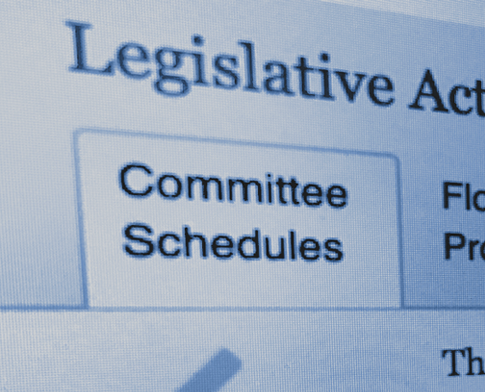Fall Legislative Outlook
Following a busy June and July, Congress will return from August break with a packed list of must-pass business to attend to this fall with less than 50 scheduled legislative days on the calendar for the year. Items that will demand attention include: addressing the expiring highway funding patch, which expires on October 29th; reaching consensus on a budget deal and the debt ceiling to avoid a government shutdown; reauthorizing funding for the Federal Aviation Administration; a vote disapproving President Obama’s Iran plan; action on cybersecurity legislation; and various tax proposals and extensions.
With the national news media focused on the Presidential election, particularly the packed Republican field of hopefuls, and just months to go before we enter the election year, Republican leadership in both chambers have expressed they hope keep the government funded with no interruptions in order to avoid another shutdown despite the abundance of opportunities that could present themselves in the coming months.
CONTINUING RESOLUTION/DEBT CEILING
A deal must come together by September 30th to keep the government running into the new fiscal year, which begins on October 1st. Most believe congress will pass a short-term extension that will line up with the pending debt ceiling deadline, forcing negotiations to the end of December. Republicans have said they want to keep defense and non-defense spending within sequestration budget caps while providing additional DOD funds separately, while Democrats, including the President have said any increase in defense spending should be matched on the non-defense side.
The September 30th deadline has presented itself as an opportunity for a handful of members to make statements on contentious issues. The first challenge could come in the coming weeks via Republican Presidential hopeful Ted Cruz (R-FL), who recently said “now is the time” to attempt to defund Planned Parenthood. Cruz and other conservatives are hopeful a rider to defund Planned Parenthood would be included in a CR, but McConnell has signaled this is not a path worth taking. He said, “The president’s made it very clear he’s not going to sign any bill that includes defunding of Planned Parenthood, so that’s another issue that awaits a new president, hopefully with a different point of view about Planned Parenthood.”
Looking down the road, Treasury Secretary Jack Lew recently warned that action to raise the $18.1 billion debt ceiling will be required in December. If Congress passes the short term CR deal, all of the above could come to a head right before the holiday break, meaning yet another last-minute, year-end showdown.
HIGHWAY FUNDING
On July 31st, Congress passed, and President Obama signed a three month, $8 billion extension of the highway trust fund. The extension (the 24th such deal struck since 2008) is set to expire on October 29th. Leadership in both chambers have expressed their desire for a long term plan to provide certainty at that juncture as opposed to yet another short term patch.
In addition, in July, the Senate passed the $275 billion Developing a Reliable and Innovative Vision for the Economy, or “DRIVE Act,” though funding would only be provided for three of the six years. As in many debates, funding will be the sticking point. Senate Democrats and House Republicans (as well as the Administration) have floated the idea of funding a long term bill through corporate tax reform, specifically using revenue raised by taxing foreign profits of American companies. Leader McConnell said he “view(s) it as a totally separate track unrelated to the highway issue.” Negotiations will continue through September and October.
FAA REAUTHORIZATION
Funding for the Federal Aviation Administration will expire on September 30th. While industry is pushing for a long-term extension, the House and Senate committees of jurisdiction let their July target for a bill slip, focusing on highway funding negotiations, making a short-term extension more likely. Transportation Secretary Foxx foresees a stopgap measure as well. Congress last passed a long term bill funding the FAA’s in 2012 following nearly two dozen short term extensions.
Obstacles to a smooth process could include House Republicans’ efforts to privatize some functions of air traffic control or amendments regarding unmanned aerial vehicles. Senator Chuck Schumer (D-NY) announced in August he intends to attach legislation creating no-fly zones for drones near airports and other areas. “When it comes to drones in the vicinity of commercial flights carrying hundreds of passengers at a time, the FAA has been playing whack-a-mole across the skies,” the Senator said.
CORPORATE TAX REFORM
This fall, Senate leadership has expressed it will tackle corporate tax reform. Senators Chuck Schumer and Rob Portman (R-OH) released a bipartisan international tax plan which would reduce the rate on US corporate profits overseas, with a one-time tax that would be “deemed” repatriated. Majority Leader McConnell, however, is pinning his hopes on kicking the can down the road to a potential Republican White House in 2017, while House Ways and Means Chairman Paul Ryan is optimistic for action soon. Ryan said, “Comprehensive reform is not possible under a president who wants to raise taxes on families and job creators. That does not mean, however, we cannot work to find common ground as a first step toward tax reform.” Tax extenders are on the yearly “to do” list and will command attention as fall moves to winter.
IRAN
Congress has until September 17th to either approve or disapprove the deal that China, France, Russia, the United Kingdom, Germany and the United States negotiated with Iran regarding the country’s nuclear program. The House and the Senate have both scheduled floor time next week for measures condemning the deal. The House version is likely to pass easily, while the path forward in the Senate has become less clear for Republicans opposing the President.
The White House will likely get its way, as Senators Chris Coons (D-DE), Bob Casey (D-PA) and Barbara Mikulski (D-MD) announced their support this week for President Obama’s plan, meaning the White House has the 34 votes necessary to ensure the resolution does not advance. As recently as last month, support among Senate Democrats was so thin that it seemed very possible the resolution of disapproval could fail to reach the 60 vote threshold necessary to end a filibuster.
CISA
Despite Leader McConnell’s best efforts in August he was forced to punt on the Cybersecurity Information Sharing Act (CISA), as he could not reach a deal with Democrats on amendments, particularly on privacy. McConnell indicated agreement was reached prior to August adjournment on a core of 21 amendments, with allowances for additional amendments once the agreed-upon 21 have been addressed. The White House endorsed the legislation in August, calling cyber an “important national security issue” and demanding “the Senate should take up this bill as soon as possible and pass it.”
HOUSE.GOV
The Week Ahead
For the main events of the next week and more, go straight to the key events on the house.gov website.
SENATE.GOV
The Week Ahead
For the main events of the next week and more, go straight to the key events on the senate.gov website.


